Echinacea and the Immune System
As I write this, there are 1,098 citations in the PubMed database for echinacea. I looked at every title to see if it was relevant to answering one question: should people who have an autoimmune disease use echinacea for allergies and colds? I examined at least 100 abstracts and downloaded five papers that seemed to be significant. Here’s what I found.
The research on echinacea is a mess. There’s no consistency in the preparations used in research, the subjects included in the studies, the outcome variables that were examined, or the combination of herbs, vitamins, or minerals used in the preparations with echinacea. That’s just to find out if echinacea has any effect on catching or treating a cold. Beyond that outcome, the research is even less clear.
I found two studies that give some perspective on whether echinacea is safe for anyone to use including those who have an autoimmune disease. The first paper is a case study on a patient who suffered a breakdown in the myelin sheath after taking an herbal preparation (1). The paper reviewed all similar cases of echinacea causing similar symptoms. Based on their conclusions, boosting the immune system with echinacea could have negative effects.
There are several problems with this case study and the conclusions the authors made. While they assigned blame to echinacea, none of the subjects used echinacea alone nor were they administered the same way. Some were given orally while two others were injections. They did not examine any measures of immune function in the patients. They did not test for metabolites of echinacea nor any other herb in the blood of the subjects. They deduced that echinacea had to be to blame because of its reputation as an immune booster. One more thing: with the millions of uses of echinacea every day around the world, there were just four cases in 16 years. You read that correctly: four in 16 years. Those are pretty good odds.
In another paper, researchers examined the safety of oral preparations of echinacea (2). This was an old-school approach: instead of selecting research papers to include in a meta-analysis, they examined all the pertinent research one article at a time. They used their knowledge of how drugs are metabolized by the body, how they interact with other medications, and many other indications related to the safety of medications including herbals. They concluded that echinacea does not interact with medications to any degree. While it may change how the medication is metabolized, echinacea doesn’t change how effective the medication is.
More important, they concluded that there’s no indication in the science that echinacea is harmful to those with autoimmune diseases. They explain the reasons why physicians have believed echinacea could have consequences, but there was no evidence it was harmful. There was also no time restriction for the use of echinacea. If you have an autoimmune disease, I urge you to download and read the second reference for yourself. It’s open access and while it’s tough reading, it’s the best resource I’ve found on the issue.
The Bottom Line
If you have an autoimmune disease, you must check with your physician before using echinacea; he or she knows the specifics of your condition. Based on my review of the research, there’s no reason you cannot use echinacea to help your immune system when it’s under attack from a virus or allergens for a few days. But that’s not my call to make; there’s always the possibility of an abnormal response or of an allergic reaction to the plant material itself. It’s something you need to talk with your healthcare professional about, but it should be a discussion, not a lecture.
I know you want clear answers, but that’s just not completely possible in this case. What you have now is information with which to make an informed decision.
What are you prepared to do today?
Dr. Chet
References:
1. Balkan Med J 2016;33:366-9.
2. Planta Med 2016; 82: 17–31.

